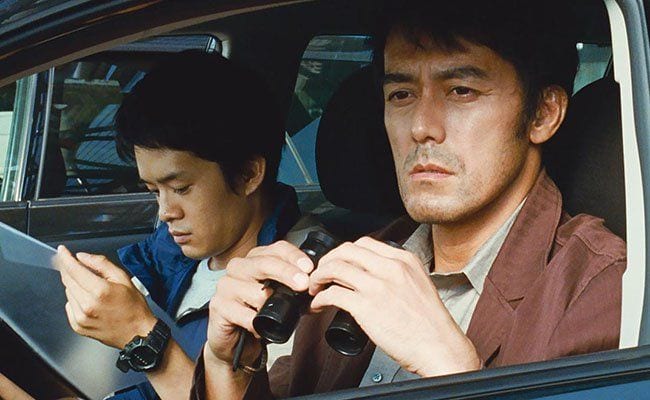
When is success or hunting for it a trap? Is it better to have dreamed of great things and fallen short or to have never had ambitions at all? Those are a couple of the questions that Hirokazu Kore-eda’s TV-like melodrama about wayward fathers and disappointed women After the Storm tangles with. Fortunately for the viewer, Kore-eda leaves those questions mostly hanging in the air and not verbalized, leaving the screen to a group of characters who are less like a family than a house of cards just waiting to be blown down by the typhoon everybody is waiting for to strike.
Although things kick off just after the death of his father, Kore-eda’s protagonist, Ryota (Hiroshi Abe), doesn’t seem that torn up about it. Neither does his mother Yoshiko (Kilin Kiki), a cheerily down-to-earth fusser and housekeeper given to dry bon mots like “new friends at my age only means more funerals.” Yoshiko is not so secretly glad to be rid of the bum, while Ryota picks through his dad’s things, barely trying to hide that he’s looking for things to pawn.
Several years back, Ryota was something of a minor sensation. His novel, The Empty Table was published to some acclaim and won an award. Since then, things haven’t gone too well, but we have every indication that this is entirely Ryota’s fault. Lean and raggedly handsome, he carries himself like some nobleman gone to seed who has no urgency about ever pulling things together. He lives apart from his divorced wife Kyoko (Yoko Maki) and their son Shingo (Taiyo Yoshizawa), and seems too lost in his own head to ever truly reconnect with them. Like his father, Ryota has a gambling problem, and tries to cover it up by running side-scams in his day-job as a private investigator. Those bets at the track, even the sure things, don’t pay for themselves, after all.
This part of Kore-eda’s story has the makings of a knotty little noir where small entanglements blow up into grander conflicts, the kind of thing that Kurosawa was knocking out earlier in his career during those morally shady postwar years. Needy and shambling, he’s compromised from the jump. There’s a neatly choreographed bit where Ryota and his younger partner — who tolerates Ryota’s lousy work habits and general louche behavior almost for entertainment — play double agent with a client they’ve been following but offer her a deal to spy instead on the man who hired them: her husband.
The workaday Japanese urban environment, all undistinguished side streets and slightly dilapidated apartment complexes, would have lent itself quite nicely to a story heavier with elements like this, bookies and scammers and confidence men. But Kore-eda pulls Ryota from that world once his bona fides as slowly disintegrating middle-aged disaster have been established. Instead, at around the halfway point, Ryota ends up back at the apartment of Yoshiko, along with Kyoko and Shingo, as the latest typhoon of the season is closing in.
By all rights, this should have meant a bottling up of emotions and frustrations. And Kyoko, at least, finally lets fly at Ryota, the ever-prodigal son who Yoshiko still dotes on as the boy with the good grades who became a novelist. The dynamic of this tightly packed apartment, where there doesn’t appear to even be any room for anyone to unfurl their true feelings, provides a good platform for Kore-eda’s perceptively written and beautifully acted but somewhat stagey final act.
When Yoshiko lets Ryota know that he’s never seemed happy in the present, but instead was “always lost in the past but chasing the future”, viewers will nod right along with her wryly delivered wisdom. But it’s too close to a moral, and as such, helps crystallize what keeps this movie from ranking near Kore-eda’s best. Set against the stark class divisions and primal fears of Like Father, Like Son (2013) or the graceful sweep of Our Little Sister (2015), both marvels of drum-tight prevision, the roaming After the Storm can’t help but feel more slight and inconsequential.
Without much at stake, Ryota will keep on doing as he has done before, as his family pulls ever further away from him, out of self-preservation if nothing else. That leaves the movie functioning as essentially a core sample taken from this family’s interior. They’re engaging individuals, to be sure; Kore-eda’s mastery of the minuet of family relationships ensures that the film remains strongly entertaining drama. But that’s the problem with being an artist — after a movie like 2008’s Still Walking, for a filmmaker Kore-eda, it’s hard not to want to demand more.


![Call for Papers: All Things Reconsidered [MUSIC] May-August 2024](https://www.popmatters.com/wp-content/uploads/2024/04/all-things-reconsidered-call-music-may-2024-720x380.jpg)



